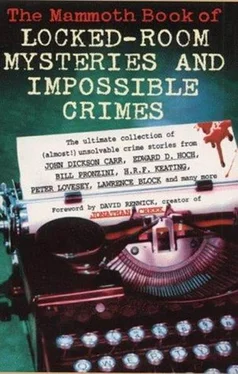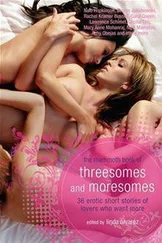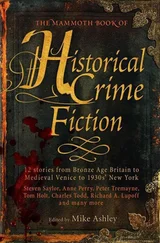Mike Ashley - The Mammoth Book of Locked-Room Mysteries And Impossible Crimes
Здесь есть возможность читать онлайн «Mike Ashley - The Mammoth Book of Locked-Room Mysteries And Impossible Crimes» весь текст электронной книги совершенно бесплатно (целиком полную версию без сокращений). В некоторых случаях можно слушать аудио, скачать через торрент в формате fb2 и присутствует краткое содержание. Жанр: Детектив, на английском языке. Описание произведения, (предисловие) а так же отзывы посетителей доступны на портале библиотеки ЛибКат.
- Название:The Mammoth Book of Locked-Room Mysteries And Impossible Crimes
- Автор:
- Жанр:
- Год:неизвестен
- ISBN:нет данных
- Рейтинг книги:3 / 5. Голосов: 1
-
Избранное:Добавить в избранное
- Отзывы:
-
Ваша оценка:
- 60
- 1
- 2
- 3
- 4
- 5
The Mammoth Book of Locked-Room Mysteries And Impossible Crimes: краткое содержание, описание и аннотация
Предлагаем к чтению аннотацию, описание, краткое содержание или предисловие (зависит от того, что написал сам автор книги «The Mammoth Book of Locked-Room Mysteries And Impossible Crimes»). Если вы не нашли необходимую информацию о книге — напишите в комментариях, мы постараемся отыскать её.
A new anthology of twenty-nine short stories features an array of baffling locked-room mysteries by Michael Collins, Bill Pronzini, Susanna Gregory, H. R. F. Keating, Peter Lovesey, Kate Ellis, and Lawrence Block, among others.
The Mammoth Book of Locked-Room Mysteries And Impossible Crimes — читать онлайн бесплатно полную книгу (весь текст) целиком
Ниже представлен текст книги, разбитый по страницам. Система сохранения места последней прочитанной страницы, позволяет с удобством читать онлайн бесплатно книгу «The Mammoth Book of Locked-Room Mysteries And Impossible Crimes», без необходимости каждый раз заново искать на чём Вы остановились. Поставьте закладку, и сможете в любой момент перейти на страницу, на которой закончили чтение.
Интервал:
Закладка:
Apparently no one ever entered the hiding-place except in the night, about two o’clock. The noises behind the wainscoting continued for a few minutes only, and after that all was silence.
In the afternoon Christopher motored into Ringhurst to buy a small saw, and a bull’s-eye lantern such as policemen use. On the way back he overtook Sir Walter with Sidney, and they accepted his offer to give them a lift back to Wood House. “Queer thing, I’m used to tramping about the whole day, and don’t turn a hair after a twenty-five-mile walk; but lately I feel done up after eight,” said the young man, who was looking pale and heavy-eyed. “I suppose it must be that the climate’s relaxing.”
Christopher was pricked with a guilty pang. He was engaged by Miss Chester to act as a detective, and yet he felt ashamed of suspecting and plotting against the man she loved. He liked Raven, too. Altogether, keen as he was to fathom the mystery, he wished that he had never come to Wood House.
They talked about the robberies as Christopher drove the car home, Sidney sitting beside him, Sir Walter leaning forward in the tonneau. “After all, it will end in our going away from the dear old place,” sighed Sidney, with tears in her eyes. “The strain is wearing mother out; and, you know, if neither of us continues living in the house it will go, as I told you, to the man who would have been the heir had the entail not been broken.”
“You’ll both come out with me to Colorado and forget your troubles. Let the chap have the place, and be thankful it’s off your hands,” said Raven.
He spoke with the sincerity of a lover, not like a schemer who would force a woman to his will by foul means if fair ones proved not strong enough.
“I feel a beast spying on him and working against him,” thought Christopher. “Suppose he knows nothing about the secret place next his room? Suppose the noises are made by rats? And what if, after all, the people who think they have been robbed never have been robbed? I’ll give Raven the benefit of the doubt until I’ve tried one more experiment.”
Tea was going on in the hall when Scarlet Runner arrived at Wood House. There were letters for Christopher, and he announced in the hearing of everyone, including the servants, that unless he should get a telegram advising him to the contrary he must leave Wood House, where he had spent such an enjoyable fortnight, immediately after breakfast the next morning.
“You’ll not come back to us?” asked Sidney, with veiled meaning in her voice.
Christopher pretended not to notice the meaning. “I’m sorry to say I shan’t be able to,” he answered. “Already I’ve been here longer than I expected.”
He did not mean to take any money from the girl, but though she could not be aware of this resolution, she seemed really sorry to have him go, failure as he had been – thus far.
Christopher took longer over dressing for dinner that night than usual. He hesitated whether to wear the studs and sleeve-links he liked best, or others which he did not care about. Also he was half minded to lock his watch up in his suit-case. Finally, however, he resolved to make his experiment bravely. “I’m not hysterical,” he said to himself, “though I might get to be if I stopped here much longer. I shan’t steal my own things and hide them, if that’s what other people do.”
Throughout his stay at Wood House he had taken his meals at the same small table, except once or twice when he had been asked to join new-made acquaintances for dinner. But to-night he invited Sir Walter Raven to dine with him, “as it was his last evening.” The young man accepted, and they talked of Colorado. Sir Walter was inviting him to come out to his ranch some day, when suddenly the expression of the once healthy, sunburnt, now slightly haggard face changed.
“By Jove!” exclaimed Raven, the blood mounting to his forehead.
“What’s the matter?” asked Christopher.
“I’m not a particularly observant chap, but I suppose I would have noticed if you’d come in without your shirt-studs. You didn’t by any chance forget to put them in, did you?”
“No; I had them in, right enough,” said Race. Looking down he saw that the white expanse of his evening shirt lacked the finish of the two pearl studs he had worn when he came into the room. His cuffs hung loose, empty of his favourite pair of links. Hastily touching his watch-pocket, he found it limp and flat.
“Well, yes, it is ‘by Jove,’” he remarked, grimly.
“Shall we call Morley Chester and tell him what’s happened?” asked Raven.
“No,” said Christopher, who sat with his back turned towards the other occupants of the room, his table being at the end by a window, and he having given his usual seat to his guest; “I’d rather not make a fuss. I shall sit till the others have gone, and no one will be the wiser. I’m sick of sensations, and don’t want to pose as the hero of one if I can help it.”
“Some people seem to like it,” said Raven.
“So I’ve thought,” replied Christopher. But his theory was upset. He could not believe in any ghostly influence strong enough to impose illusions upon his mind. A queer thrill went through him. He was struck with horror by the mystery, which had never impressed itself so vividly upon him before.
It was a relief when the rest of the diners left the room, and he was free to slip away without making statements or answering questions. Luckily for him – if unluckily for the Chesters – there were few guests in the house. Those who were there – with the exception of Sir Walter Raven – were new arrivals, and strangers to Christopher. For this reason he escaped the fire of curiosity which raged round most departing visitors at Wood House. He went to his room, locked the door, and, having listened with his ear at the wainscoting, presently began as noiselessly as possible to saw out a selected square from the oak panelling behind his curtained four-poster bed. The saw was sharp, and he worked as energetically as if he had an injury to avenge. In an hour he had the panel ready to come out of its frame. But he did not venture to take it out and commence his explorations until the house was still for the night.
Not once while he worked had there been the faintest sound on the other side. Removing the square of wainscoting at last as if it had been a pane in a window (odd, the oak here hadn’t half that strong, subtle fragrance of rich old wood that it had downstairs in the dining-hall and the two private sitting-rooms!), Christopher turned on the light of his lantern and peered into the obscurity on the other side.
There was a hollow space between this wall and the next – a space rather more than two feet wide. Christopher had moved his bed, and cut into a panel so low down that to peer into the opening he had to kneel. The square aperture he had made was so large that by squeezing he could thrust his shoulders through as well as his head. So far as he could see, there was no door on the opposite side, nor was there furniture of any sort in the secret place the stream of light lit up. But at the far corner there was something low and long, and blacker than the darkness. It might be a heavy beam, he thought, against a wall, or it might be a box.
Withdrawing his head, he looked at the quaint grandfather clock which stood in a corner of his room. It was never right within half an hour, but he had now no watch to consult. According to the old timepiece it wanted twenty minutes to two. Perhaps it was later, perhaps earlier; but, in any case, Christopher had time to make researches before the nightly footfalls were due.
It was difficult to wriggle through the square hole in the wainscoting, but he did it, after ridding himself of coat and waistcoat. Now he stood in a long, narrow space between the walls of his own room and Sir Walter Raven’s. He had slipped off his pumps, and in stockinged feet began cautious explorations, the lantern making a pathway of light. The thing he had seen at the far end was not a beam. It was a box – two boxes – three boxes – of common wood, such as come into every household from the stores. They had lids, but the lids were not nailed down. Christopher lifted one. The box was filled with jewellery, heaped up in neat piles, according to its kind, on some dark garment folded underneath. There were a pile of bracelets, a pile of brooches, a pile of rings, and a collection of watches like glittering gold eggs in a nest. The second box had the same description of contents, though there were more miscellaneous articles – gold or jewelled belt-buckles, hatpins, a diamond dog-collar or two, and several strings of pearls. In the third box, much smaller than the other two, were purses, some of leather, some of gold or silver netting; cigarette-cases with jewelled monograms; and, weighted down by a lump of gold chains, lay a quantity of bank-notes.
Читать дальшеИнтервал:
Закладка:
Похожие книги на «The Mammoth Book of Locked-Room Mysteries And Impossible Crimes»
Представляем Вашему вниманию похожие книги на «The Mammoth Book of Locked-Room Mysteries And Impossible Crimes» списком для выбора. Мы отобрали схожую по названию и смыслу литературу в надежде предоставить читателям больше вариантов отыскать новые, интересные, ещё непрочитанные произведения.
Обсуждение, отзывы о книге «The Mammoth Book of Locked-Room Mysteries And Impossible Crimes» и просто собственные мнения читателей. Оставьте ваши комментарии, напишите, что Вы думаете о произведении, его смысле или главных героях. Укажите что конкретно понравилось, а что нет, и почему Вы так считаете.










